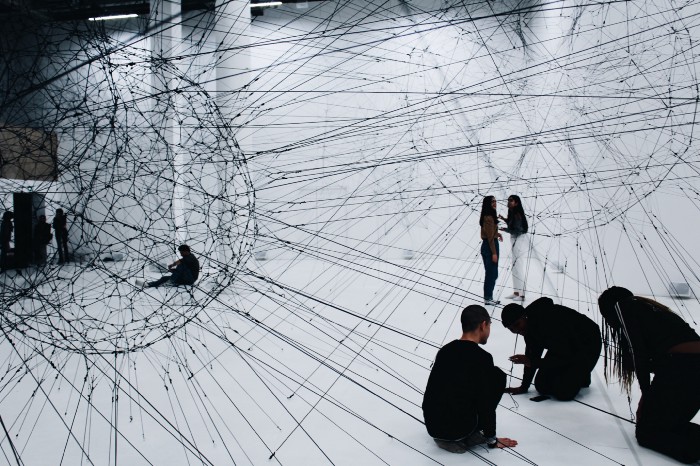
What if the Internet were still being designed? What if we knew everything we now know about surveillance capitalism and social media addiction and Instagram depression and fake news, and had the chance for a big do-over?
Well, we do. No matter how seemingly entrenched the monopolies of Facebook and Google, the Internet is still a work in progress. Code is not set in stone, it’s malleable. So are our network protocols, our software, our business models, regulatory statutes, and ethical frameworks.
What would you do if you were in charge of the net? Well, you are.
And to celebrate and interrogate this assertion, I’m going to be teaching a new course at Queens College Masters Program in Media Studies in collaboration with Jeff Jarvis at CUNY’s Craig Newmark Graduate School of Journalism, called Designing the Internet. And you’re invited. Here’s the description:
Designing the Internet.
This course, open to graduate students from any discipline at the Grad Center or any CUNY campus, (as well as undergraduates by permission) will cover the history and impact of the internet to date, with an emphasis on how we might still intervene in the direction of its development. We will test the hypothesis that the Internet is still in its infancy, and that we are still vested with the agency and responsibility to design and steer the net we wish to see in the future.
Throughout the course, students will work on a proposal for that future. This may take the form of a new feature, company (though this is not intended as an entrepreneurial course), regulatory or ethical regime, standard for design, news and information strategy, a business model to support information or creativity, a covenant or manifesto of rights and responsibilities, a perspective from communities and markets that are underserved, net syllabi…anything.
The course will be taught by Jeff Jarvis of the Newmark J-School, author of What Would Google Do? and Public Parts, and Douglas Rushkoff of Queens College, author of Throwing Rocks at the Google Bus, Team Human, and Present Shock. They approach the subject from different perspectives: Jarvis a defender of internet freedoms, Rushkoff a critic of the net’s current proprietors. But they align on the goals for the internet and this course: to alter the discussion of the net from dystopian despair to productive engagement, to propose that the net is not finished, to suggest to students that they consider the possibility that they have the time and ability to redirect the net to better ends, and to empower themselves and others.
The course will be housed at the Journalism School because, for those students, this is an attempt to help them see that the canvas for journalistic service is broader than publication. For students from other schools, it is an opportunity to bring their disciplines to the evaluation and development of the net, as well as the power of the net to their respective disciplines and areas of practice, from science and humanities to economics and social justice.
Students will select a proposed project early in the course — individually or in groups — and work on it through the term, with workshops and milestones along the way and presentations at the end. Class time will be devoted to both review of progress on projects, as well broad study of the state of the net and human agency, with possible topics and a preliminary list of readings including: Approaching Tech and Media as an Environment (McLuhan and Mumford), Visions of the Networks (Borges, Turing, Vannevar Bush), Designing the Net (Ted Nelson, Berners-Lee, Licklider), Systems of Information and Disinformation (boyd, Tucker, Benkler, O’Neil), Race, Community, and Networks (André Brock Jr., Charlton McIlwain, Meredith Clark, Ruha Benjamin), Design and Design Thinking (IDEO, New Public), The Net’s Economics (Tim Wu, Shoshana Zuboff), Activism, Advocacy, and Leadership (Hashtag Activism, Ethan Zuckerman), Crypto and Decentralized Networks (Gilder, Art Brock, Satoshi), Internet of Things, AR/VR, and many more.
Outcomes include an understanding of the history of the internet and its antecedents; of issues related to the impact of the net (e.g., freedom of expression, privacy, freedom from harassment); of uses of the net by communities; of design-thinking process; of the economics of the net; of law and regulation of the net.
If you’re a student anywhere in CUNY, just sign up for Studies in Communication at Queens College, course 46646, with a CUNYPass. (Undergrads need permission.) If you’re not a student, you can take the course as a non-matriculated grad student by applying here, or if you don’t have a college degree, you can for non-matriculated undergraduate status. (Non-matriculated means you take a credited course a la carte, not toward a particular degree.) The course will take place at the CUNY J-School in Manhattan, on Mondays at 2p-450p, beginning January 31.
This is the first of what we hope will be a new series of courses in Internet Studies at CUNY, and maybe even a new degree.
This whole project is an exercise in optimism on my part, through which I hope to apply a whole lot more energy toward what we can do now rather than just what we’ve done wrong to this point. It’s not too late to turn this thing around.